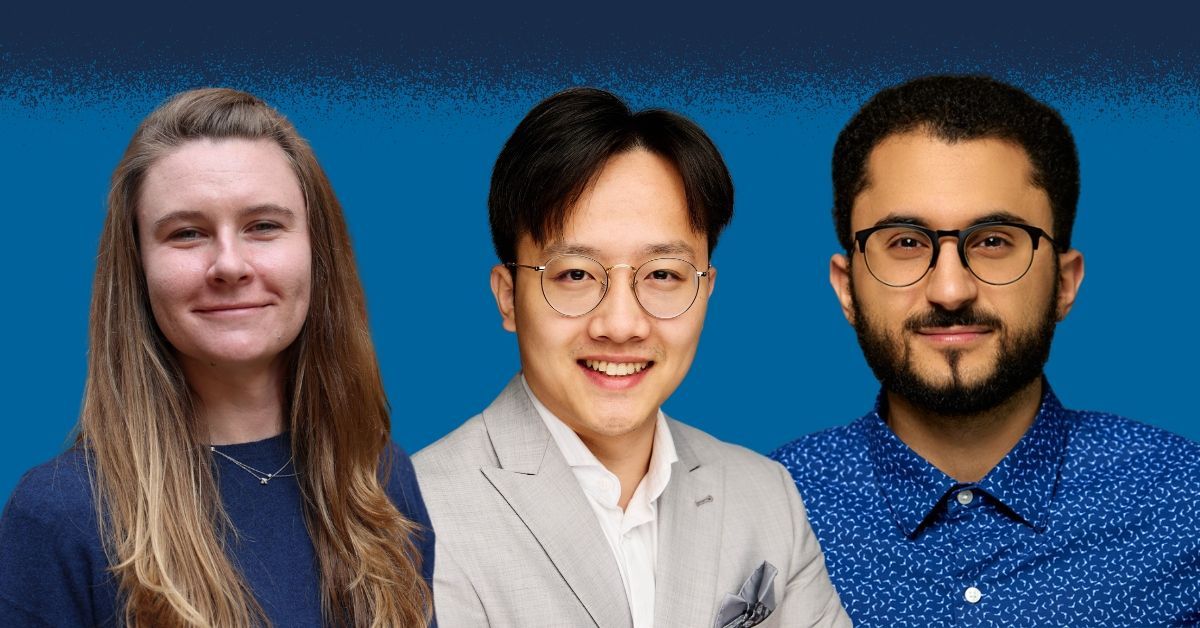Triton Alumni Shine on 2025 Forbes 30 Under 30 List
Story by:
Published Date
Article Content
Pushing the boundaries of engineering and entrepreneurship, three UC San Diego alumni from the Jacobs School of Engineering have earned spots on the 2025 Forbes 30 Under 30 lists for their groundbreaking work. Liz Izhikevich, Sai Zhou and Mohammad Alkhadra have each forged unique paths in their respective fields—internet security, biomedical engineering and critical minerals—and are translating their academic research into real-world impact. From revolutionizing lithium extraction to securing satellite networks and advancing wearable ultrasound technology, these alumni exemplify the spirit of curiosity that makes UC San Diego a global hub for cutting-edge research and innovation.
UC San Diego Today sat down with each of this year’s recipients to learn about their work, the value of this milestone achievement and how their formative years as Tritons led them to where they are today:

When Liz Izhikevich set out to study internet security, she didn’t expect her research to have far-reaching implications for networks orbiting the Earth. But now, as an assistant professor of electrical and computer engineering at UCLA and a research scientist at Censys, she is redefining how researchers detect security threats on the internet—both on the ground and in space. Her work has even helped improve video streaming for over a million satellite broadband users, a discovery that helped earn her a place on the Forbes 30 Under 30 Science list for 2025.
Izhikevich’s path to this recognition began at UC San Diego, where she earned her bachelor’s and master’s degrees in computer science. To this day, her connections to the Triton community remain strong: she keeps in close contact with her former advisors (Geoff Voelker and Stefan Savage), collaborates with faculty on ongoing research and visits her sister, Katherine, who is currently pursuing a Ph.D. in computer science.
While earning her Ph.D. at Stanford University, Izhikevich deepened her research on internet security, studying exposed services and building scanning systems to analyze vulnerabilities. Then, when preparing for her qualifying exam—which required her to present on an adjacent topic—she took an unexpected turn.
“I started looking into the data that I had already collected from my internet scanning research, and I had this idea—was there any data in my existing dataset that somehow relates to satellite networks?” she recalled. Her hunch proved correct: there were exposed services in the Starlink-SpaceX network already in her dataset—she just hadn’t filtered for them.
That revelation led her team to develop a new method to track satellite network performance, and the practical applications of this work soon became apparent. Their research revealed that over a million people stream Netflix over Starlink, leading to collaborations to optimize video algorithms for satellite networks.
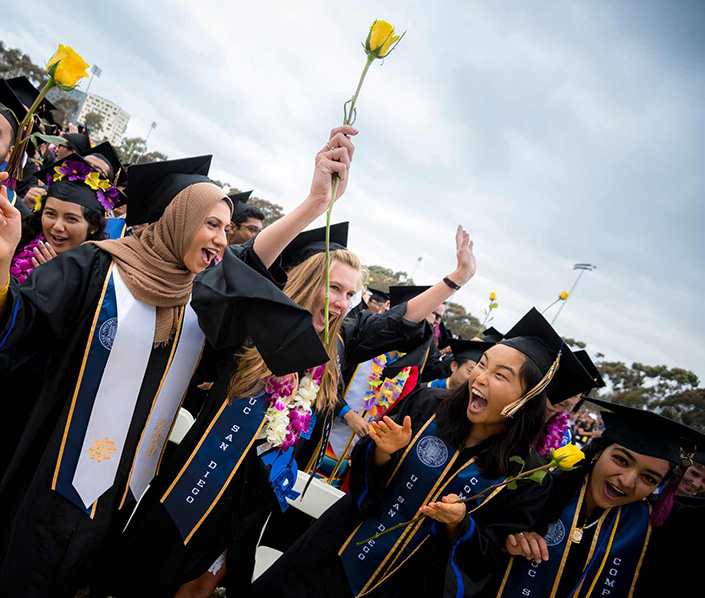
Today, Izhikevich leads the Security and Networking (ScaN) Lab at UCLA, where she and her students apply data-driven methods to study internet security and performance.
“I love interacting with students,” she said. “I rely on them for thinking about the world in creative ways and proposing creative solutions. I think it’s key to have all these young minds who see the world slightly differently, to be able to essentially pitch in and propose ideas—that’s how we push science forward.”
Returning to the UC system last July felt like coming “home” for Izhikevich. “On these UC campuses, you just feel it in everyone’s bones. Everyone’s there with a purpose. The students are very driven and motivated. I love the UC crowd,” she said.
Her time at UC San Diego instilled in her not just technical expertise but a sense of balance—an ethos she says is embodied by Earl Warren College’s motto, “Toward a life in balance.” “The computer science department really instills that as well,” Izhikevich said, adding that it’s something that she hopes to inculcate in the students working in her lab at UCLA. A daily yoga practice, which she started during her undergraduate years, remains an integral part of her routine.
Beyond academic circles, Izhikevich sees her Forbes recognition as validation of her work.
“It shows that there is real impact being made,” she said. Whether optimizing satellite networks or guiding the next generation of computer scientists, Izhikevich is helping shape the future of internet security—one connection at a time.
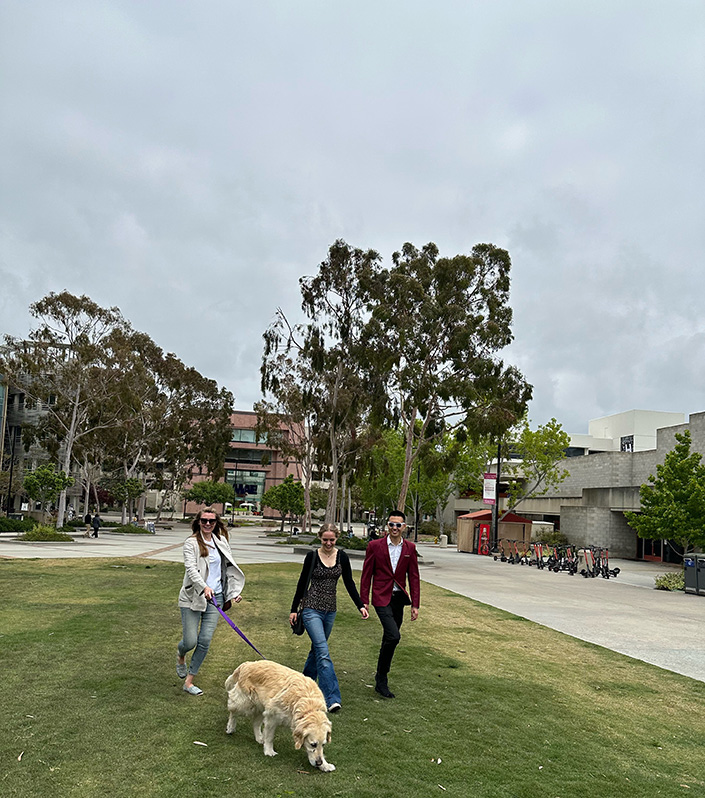

Sai Zhou’s journey from UC San Diego graduate student to med tech entrepreneur is a testament to the university’s thriving innovation ecosystem. Zhou, who earned his doctoral degree in the Materials Science and Engineering program in September, was selected for Forbes’ 30 Under 30 Science list for his groundbreaking work in wearable ultrasound technology. As founder and CEO of CircuCare Inc., he is leading efforts to commercialize an innovative, hands-free ultrasound device—designed for continuous cardiovascular imaging—that promises to revolutionize patient care.
Zhou’s research began in the Sheng Xu Lab at the Jacobs School of Engineering, where he focused on developing different wearable ultrasound devices for cardiovascular monitoring.
“My major focus in the lab was using those wearable ultrasound devices for cardiovascular applications,” Zhou explained. “Through that work, I realized a critical clinical unmet need: hospitals rely on daily bedside ultrasound scans that require trained sonographers—a resource already in short supply—to manually operate handheld probes. This process is labor-intensive, costly, and only provides intermittent snapshots of cardiovascular function.”
Recognizing these limitations, Zhou envisioned a hands-free, wearable ultrasound patch that would deliver continuous, real-time imaging at home without the need for constant technician involvement. By integrating AI-driven analysis and remote data access, his innovation not only promises earlier detection of cardiovascular diseases but also helps streamline workflows in overburdened healthcare systems. The result is a more accessible, cost-effective solution that could transform patient monitoring and support better patient outcomes on a broad scale.
Beyond the lab, Zhou credits UC San Diego’s Institute for the Global Entrepreneur (IGE) for helping him transition from researcher to startup founder. Through IGE, he participated in multiple entrepreneurship training programs, including the Lab to Market program, a collaboration between the Rady School of Management and Jacobs School of Engineering.
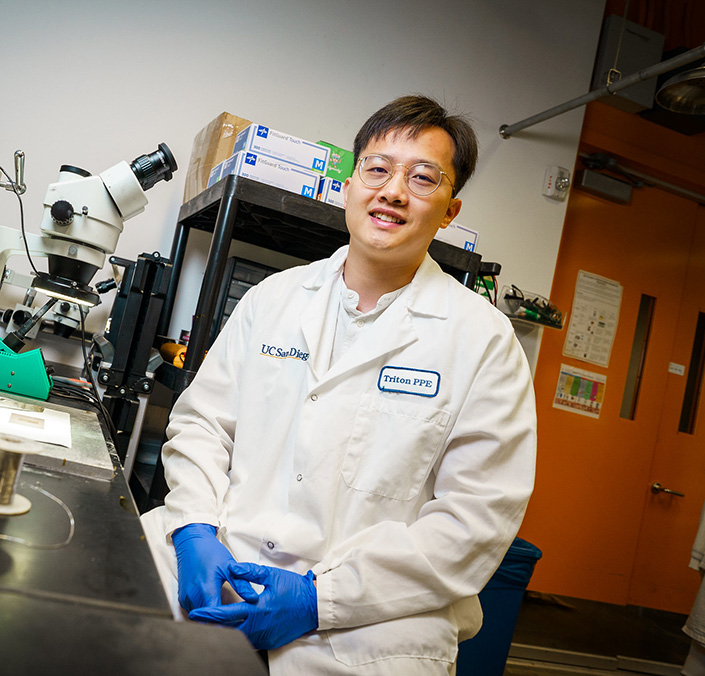
“This program is basically you, as an engineer or scientist from a research lab at Jacobs, jumping into the startup ecosystem, trying to work with those MBAs from Rady to get your idea or your technology from the lab to the market,” Zhou said.
Zhou also received mentorship from UC San Diego alumni, including Lu Yin of Persperion Diagnostics, who provided guidance on launching a startup. Today, Zhou maintains an office on campus in the IGE spaces in Franklin Antonio Hall, where he meets with investors and continues to develop CircuCare’s technology.
“I think UC San Diego has an awesome innovation ecosystem, and I’ve gotten a lot of help from alumni,” he said. Though CircuCare remains in its early stages, the company is currently iterating its technology and raising pre-seed funding. Zhou envisions a future where wearable ultrasound devices become a standard in post-operative and at-home patient monitoring.
For Zhou, collaboration remains at the heart of his work. “I want to talk with people, I want to collaborate and exchange ideas, and would love to work with people who have well-aligned dreams,” he said. “Feel free to reach out to me if you think we can potentially make some big things. Let’s chat.”
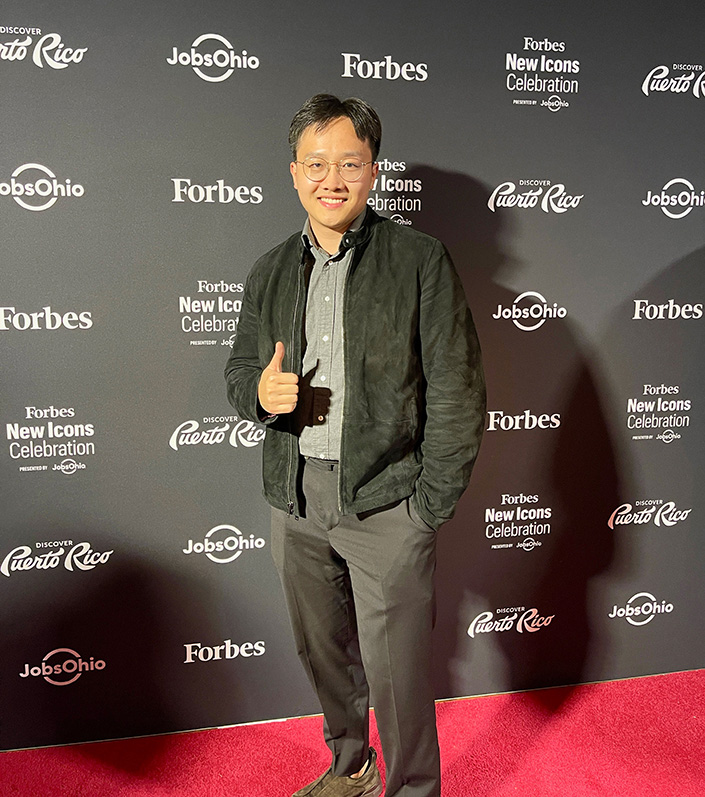

For Mohammad (Mo) Alkhadra, the road to entrepreneurship was not a straight path, but a series of pivotal choices. Born in Saudi Arabia, Alkhadra moved to the United States to attend UC San Diego in 2013 with an interest in chemical engineering but little idea where it would take him. That curiosity and drive have culminated in Lithios, a startup he co-founded to revolutionize lithium extraction—an innovation that could reshape the battery industry. Just a little more than a decade after he first set foot in San Diego, Alkhadra has been named to the Forbes 30 Under 30 Energy & Green Tech list.
Alkhadra spent five years at UC San Diego, earning his bachelor’s and master’s degrees in chemical engineering. It was here that he first experienced the thrill of research—working in Darren Lipomi’s lab—and he credits the mentorship he received there with inspiring him to pursue a Ph.D. at MIT.
While earning his doctoral degree, Alkhadra’s research initially focused on water treatment, using electrochemistry to separate contaminants from water. However, he saw a greater business opportunity in applying similar techniques to lithium extraction.
“I think what drove us to venture into this space is an important observation we made back in 2021, 2022, which is that the world needs a ton more lithium to power electric vehicles and lithium batteries in general for energy storage. But the ways by which lithium is mined today are completely unscalable to meet that demand,” Alkhadra said.
Recognizing this gap, Alkhadra co-founded Lithios in 2023 with his Ph.D. advisor, Martin Bazant, to commercialize a proprietary electrochemical lithium extraction method.
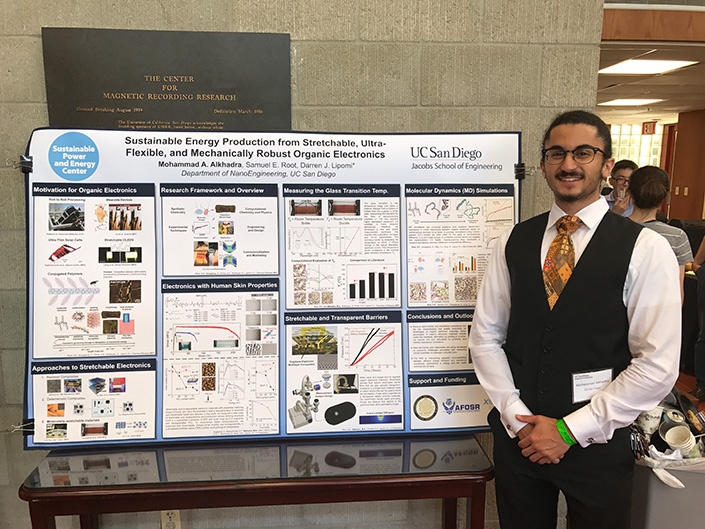
“There was a huge opportunity for us to build, develop and scale this technology with Lithios to address that deficit or anticipated deficit in global supplies of lithium and to really undercut the cost of existing ways by which lithium is made. Most importantly, too, is to make the lithium mining and extraction process far more robust, sustainable and ultimately globalized,” he said.
In 2022, Alkhadra was awarded the Activate Fellowship, a prestigious program supporting early-stage technology entrepreneurs. That recognition helped Lithios raise nearly $2 million in pre-seed funding, led by Lowercarbon Capital, a major investor in climate-focused startups. With further venture capital and government grants, Lithios has now secured approximately $15 million in funding.
Beyond his technical achievements, Alkhadra has remained closely connected to UC San Diego despite his move to the Boston area, where he resides today. He donated and co-developed the Triton Bar Park, an outdoor fitness space on campus that opened in 2019. “It’s something I always wished I had as an undergrad—to really have the opportunity to work out outdoors and use body weight to improve fitness,” he said.
Looking back, Alkhadra describes his years in San Diego as transformative—not only academically but personally as well. “The support and community and environment that I had at UC San Diego was irreplaceable. I don’t think I would be where I am without that kind of support."
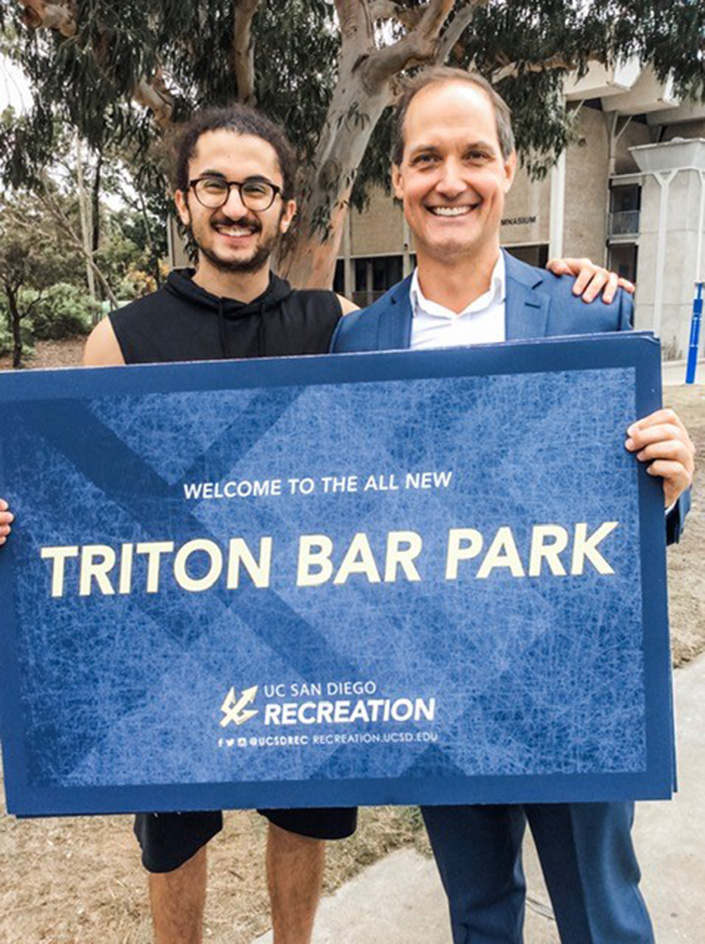
You May Also Like
Stay in the Know
Keep up with all the latest from UC San Diego. Subscribe to the newsletter today.
